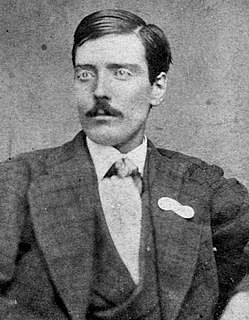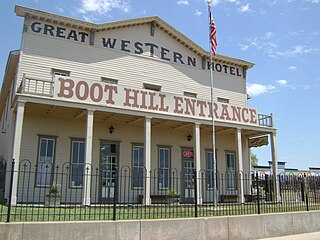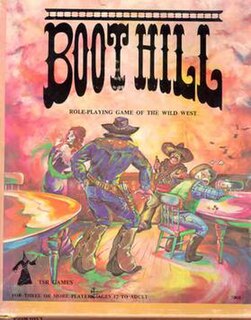
Dodge City is the county seat of Ford County, Kansas, United States, named after nearby Fort Dodge. The city is famous in American culture for its history as a wild frontier town of the Old West. As of the 2010 census, the city population was 27,340.
The United States Basketball League, often abbreviated to the USBL, was a professional men's spring basketball league. The league was formed in 1985.

Bartholemew William Barclay "Bat" Masterson was a U.S. Army scout, lawman, professional gambler, and journalist known for his exploits in the 19th-century American Old West. Born to a working-class Irish family in Quebec, Masterson moved to the Western frontier as a young man and quickly distinguished himself as a buffalo hunter, civilian scout, and Indian fighter on the Great Plains. He later earned fame as a gunfighter and sheriff in Dodge City, Kansas, during which time he was involved in several notable shootouts.
William Eugen Burrows, Jr., known professionally by his stage name Billy Drago, is an American television and film actor. Frequently cast in the role of villain, Drago's films have included Clint Eastwood's western Pale Rider and Brian De Palma's The Untouchables.

Sitka is an unincorporated community in Clark County, Kansas, United States.

Ed Masterson was a lawman and the oldest brother of the American West gunfighters Bat Masterson and James Masterson.

The Long Branch Saloon was a well-known saloon in Dodge City, Kansas from about 1874 to 1885. It had numerous owners, most notably Chalk Beeson and gunfighter Luke Short. The establishment provided gambling and live entertainment, including Beeson's five-person orchestra. It was the scene of several altercations, shoot-outs, gunfights, and standoffs often associated with cattle towns in the American wild west, the most famous of which was the 1879 Long Branch Saloon Gunfight, in which Frank Loving killed Levi Richardson.
The Kansas Cowboy Hall of Fame, is located at the Boot Hill Museum in Dodge City, Kansas. The first inductees were selected in 2002.

The Kansas Lottery is run by the government of Kansas. It is a charter member of the Multi-State Lottery Association (MUSL).

Chalkley McArtor "Chalk" Beeson was a well-known businessman, lawman, cattleman and musician but was best known for his ownership of the famous Long Branch Saloon in Dodge City, Kansas.
The Boot Hill Bowl was a National Association of Intercollegiate Athletics post-season college football bowl game, played in Dodge City, Kansas from 1970 to 1980.

The site of Fort Dodge in the U.S. state of Kansas was originally an old campground for wagons traveling along the Santa Fe Trail, just west of the western junction of the Wet and Dry Routes and near the middle or Cimarron Cutoff. On March 23, 1865, Major General Grenville M. Dodge, who commanded the 11th and 16th Kansas Cavalry Regiments, wrote to Colonel James Hobart Ford to propose establishing a new military post west of Fort Larned. On orders of Col. Ford, Captain Henry Pearce, with Company C, Eleventh Cavalry Regiment, and Company F, Second U.S. Volunteer Infantry, from Fort Larned, occupied and established Fort Dodge on April 10, 1865.
The Long Branch Variety Show is a western saloon show presented in the Long Branch Saloon located at Boot Hill Museum, a non-profit entertainment and museum theme park, in Dodge City, Kansas.
The Boot Hill and Western Railway, is a railway between Dodge City and Wilroads in Kansas owned by the Boot Hill and Western Railway Company. It consists of a single track section, about 42 kilometers long. It mainly transported agricultural products and had two interchanges, one with the BNSF Railway and another with the Cimarron Valley Railroad. The railway was given an exemption notice in 2005. Transport between Bucklin and Wilroads stopped in Autumn 2005 due to a lack of traffic, it has only operated eight trains since September 2000. The Boot Hill and Western Railway Company acquired part ownership of the track in September 2000 from the previous owner, the Dodge City Ford and Bucklin Railroad Company. It previously had a role in the interconnection with the Bucklin Union Pacific Railroad.

Boot Hill Museum is an American historical museum located in Dodge City, Kansas.

The Dodge City Law were a professional indoor football team based in Dodge City, Kansas. The team joined the Champions Professional Indoor Football League (CPIFL) in 2013 as an expansion member for the 2014 season. In 2014, the CPIFL merged with the Lone Star Football League (LSFL) to form Champions Indoor Football (CIF). The Law played their home games at the United Wireless Arena.
This timeline of college football in Kansas sets forth notable college football-related events that occurred in the state of Kansas.
Dora Hand, aged c. 34, was an American dance hall singer and actress in Dodge City, Kansas, who was mistakenly shot to death from ambush by a young suitor, who was acquitted of criminal charges in the case. Hand was also linked romantically with James H. "Dog" Kelley, the mayor of Dodge City from 1877 to 1881.











